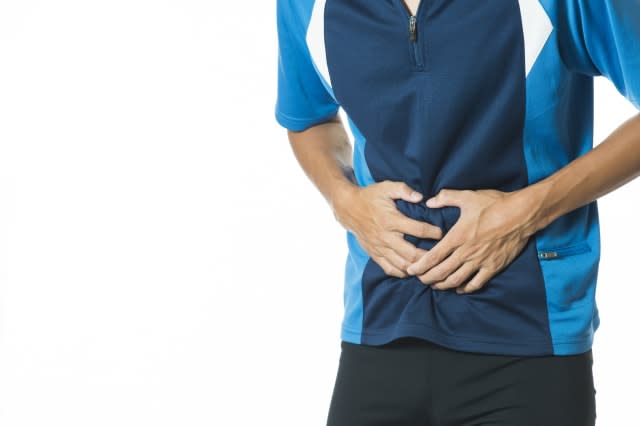Flatulence problems? What causes it and what you can do

Everyone breaks wind, but for some people excessive flatulence can be a real problem. So how does the gas get there, and what can you do to ease your digestion?
See also: Yoga poses to help digestion
See also: Gut health and weight loss: what you need to know
Causes of flatulence
A variety of things can cause gas - including diet, digestive conditions, and even some medications. Wind gets in the body in one of two ways: by swallowing air, or being produced from the fermentation of food in the colon.
Swallowing air
While it's natural to swallow some air when eating, some things can cause you to swallow more, such as chewing gum, smoking, sucking on hard sweets, having loose-fitting dentures, and not chewing food slowly and thoroughly enough. Fizzy drinks also increase the amount of carbon dioxide in your gut, although this is more likely to cause burping than flatulence.
Food and drink
Most people who suffer from excessive flatulence (and even those who don't!) will have certain 'trigger' foods that make it worse. Wind is produced by bacteria breaking down food in the colon. Some types of carbohydrate can't be digested and absorbed by the intestine easily – and it's these that pass down into your colon to be broken down by bacteria, producing gas.
Foods which have a high amount of unabsorbable carbohydrates include:
• beans
• broccoli
• cabbage
• Brussels sprouts
• cauliflower
• pulses
• lentils
• onions
• prunes
• apples
• raisins
Foods containing a type of sugar called fructose (such as fruit juice) can also cause wind, as can the sweetener sorbitol, found in things like sugar-free gum and slimming products.
Health conditions and medications
Certain health conditions can cause flatulence, including irritable bowel syndrome, coeliac disease, lactose intolerance, and gastroenteritis. If you suffer from indigestion or constipation, wind can also be a problem.
Some types of medication can cause indigestion, resulting in flatulence. These include non-steroidal anti-inflammatory drugs (NSAIDs), such as ibuprofen, some laxatives, antifungal medicines, statins, and varenicline (Champix) used to help people stop smoking. Never stop taking prescription drugs without speaking to your doctor first.
Over-the-counter remedies
There are several over-the-counter remedies that can help treat the symptoms of flatulence, including charcoal tablets and dietary supplements such as Alpha-galactosidase. Speak to your GP or pharmacist before you try them, as some may not be suitable if you're taking certain types of medication.
Try yoga
Regular exercise - particularly yoga - is a good way to help improve your digestion and ease bloating and gas. To relieve trapped wind, try the knee-to-chest pose.
Lie flat on your back, and hug one knee to your chest at a time. Inhale deeply and then rock your knee from side to side to help massage your abdominal area and release wind. Change legs, hugging the other knee - and then hug both knees into the chest together and rock from side to side. Repeat a few times, breathing deeply.
Change your diet
As well as cutting back on the foods listed above, you might want to consider limiting the amount of high-fibre bran and processed foods you eat. You may also want to try the following food swaps:
• Rice milk for cow's milk
• Bananas, blueberries and melon for apples, peaches and plums
• Gluten-free and spelt cereals and bread for wheat and rye products
• Carrot, celery, green beans, lettuce, parsnip, pumpkin, and tomato for artichokes, asparagus, Brussels sprouts, broccoli, cabbage, onions, and peas.
Some people find drinking peppermint tea or taking small amounts of ginger helps. (Pregnant women should consult their GP before taking ginger).
Keep in mind that people react differently to certain foods, and even seemingly 'safe' foods can still cause flatulence. You may find it helpful to keep a food diary to see which foods make your symptoms better, and which make them worse.
Eating six small meals a day rather than three big meals can help, as eating smaller portions is easier to digest and may produce less gas.
When to see your doctor
If you regularly experience discomfort, bloating, or cramping after eating, with or without passing gas, it's important to see your doctor. Your GP will want to ask questions and check for things like IBS, Crohn's disease, ovarian cancer, and celiac disease.
It's also worth seeing your GP about excessive burping. This can be a sign of an ulcer, gallbladder problem, hiatal hernia, weakened lower oesophageal sphincter, or erosion of the oesophagus.



